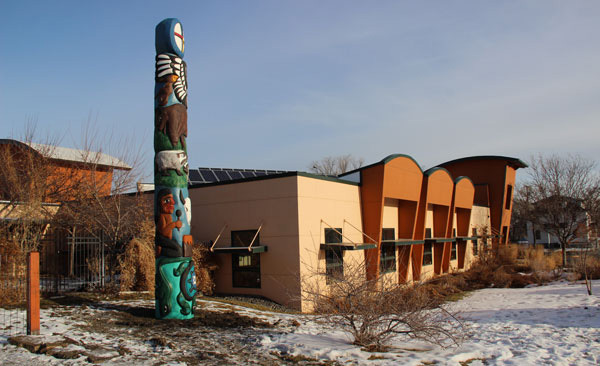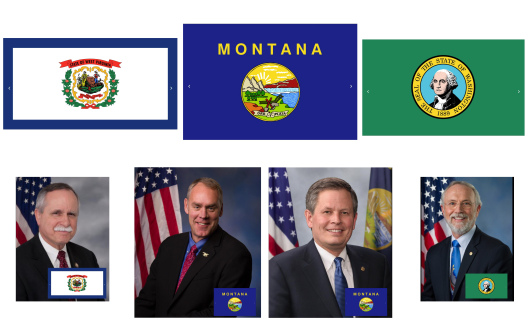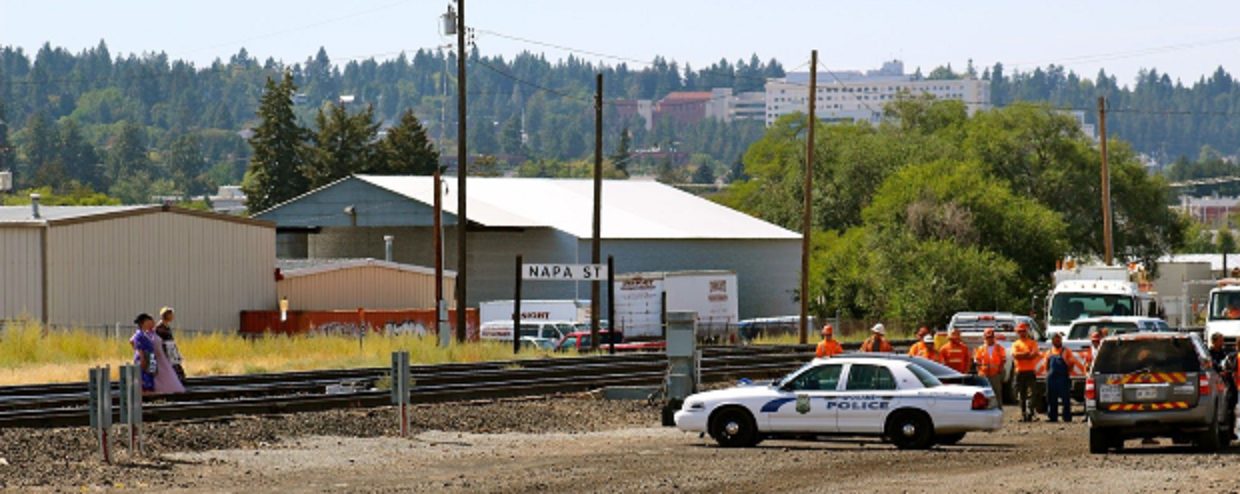
by Deep Green Resistance News Service | Apr 24, 2016 | Mining & Drilling, Protests & Symbolic Acts
Via Censored News
EAGLE PASS, Tex. — Native American Groups gathered today for a historic rally and march to protest the open-pit coal strip mine in Eagle Pass, Tex. The protesters called on the U.S. Army Corps of Engineers to rescind the mine’s permit, halt expansion and protect the land from further destruction. The project, owned by Dos Republicas Coal Partnership, mines lignite coal, which is transported by train from Maverick County across the border to be burned in a Mexican coal-fired power plant. The mine began operating several months ago, despite local opposition, and is harming the ancestral homelands of many Native groups and damaging sacred lands and more than 100 archaeological sites.

“This mine has already caused irreparable damage, destroying multiple burial sites and erasing our cultural heritage in the process,” said Maria Torres, Tribal Chairwoman of the Pacuache Clan of Texas. “This land is our patrimonial heritage, and it holds the story of our ancient aboriginal people—how we lived and how we died. When we lose access to our land and to the ancient wildlife of the area, from the jaguarundi and ocelot to crucial plant life, we lose part of our heritage and our connection with Mother Earth.”
Many Native groups say they were not properly consulted by Federal agencies as required prior to granting the permits necessary for the coal mine to open. More than eight thousand Eagle Pass residents and allies signed a petition in opposition to the Dos Republicas mine before its opening.

“This project is the worst example of environmental injustice I’ve seen,” said Dr. Jonathan Hook, former Director of Environmental Justice and Tribal Affairs for the EPA, Cherokee Nation citizen and Maverick County resident. “Everything about it is wrong. Given the incomplete processes and potential damage to one of the most vulnerable communities in the country, the Dos Republicas mine should have been stopped before it even started.”
Representatives from the Lipan Apache Band of Texas, Pacuache Band Coahuiltecan Nation, Carrizo-Comecrudo Tribe of Texas, and American Indian Movement of Central Texas were present at the Saturday event, which included Native regalia, drumming, and other cultural expressions along with large banners, signs, and puppets.

“Native leaders, tribal members and allies from across the country are uniting here today, and they join thousands from the area who are standing up against this disastrous project,” said Dr. Tane Ward, and Native and decolonial organizer working with the Sierra Club. “It’s unclear why the state of Texas has been so supportive of the controversial mining project. Not only does it harm culturally rich and historic land, the Dos Republicas mine threatens the safety and livelihood of those who live nearby all so the coal can be shipped to Mexico and burned in coal plants. It’s time for this dangerous project to be stopped, once and for all.”
Read more about the Dos Replicas Mine at the Sierra Club Lone Star Chapter’s website.

by Deep Green Resistance News Service | Jan 23, 2016 | Colonialism & Conquest
Featured image: The 22-foot western cedar totem pole, which features animals and symbols important to the Northern Cheyenne people was created by Master Carver and Lummi Elder Jewell James and the House of Tears carvers, of the Lummi Nation. The totem pole is a gift from the Lummi Nation to members of the Northern Cheyenne Tribe in southeast Montana as a symbol of solidarity between two tribes whose homelands are threatened by proposed coal export projects. A dedication ceremony for the totem pole was held on January 22, 2016, outside the Northern Plains Resource Council building in Billings, Montana, where the totem pole will stand until a more permanent home is found on the Northern Cheyenne Reservation. Photo courtesy of the Northern Plains Resource Council.
By Sandy Robson / Coal Stop
Author’s note: Today, one hundred and sixty-one years ago, the Treaty of Point Elliott was signed on January 22, 1855, by Isaac Stevens, then-Governor of Washington Territory, and by Duwamish Chief Seattle, Lummi Chief Chow-its-hoot, Snoqualmie Chief Patkanim, and other chiefs, subchiefs, and delegates of tribes, bands, and villages.

Elliott Treaty monument in Mukilteo, WA
In my endeavor to honor today’s 161st anniversary of the signing of the Treaty of Point Elliott, this piece brings attention to the disturbing fact that, presently, certain members of Congress are dishonoring that very same treaty as they seek to undermine it.
Treaty rights of the Lummi people are secured to them by the U.S. federal government in the Treaty of Point Elliott. Specific to treaty fishing rights, is Article 5 of the Treaty provides that, “The right of taking fish from usual and accustomed grounds and stations is further secured to said Indians in common with all citizens of the Territory. . .”
In determining whether Lummi Nation’s treaty-guaranteed rights of access to its usual and accustomed fishing grounds and stations, and harvest of fish, would be adversely impacted by the Gateway Pacific Terminal (GPT) project, a 48 million metric ton per year coal export terminal, the U.S. Army Corps of Engineers (“the Corps”) will be applying a de minimis threshold standard. Any impacts considered to be greater than de minimis by the Corps would warrant the GPT permit denial that Lummi Nation requested of the Corps back over a year ago, on January, 5, 2015.
Underneath the brief summary below of the legislative efforts of several members of Congress, is a detailed outline of the politicians; the campaign money, totaling over a quarter million dollars those politicians have received thus far; and the companies and projects, all relating to legislation that would diminish and undermine tribal treaty rights pertaining to proposed coal export projects in Washington state.
The Story
Congressional legislators who are backed by the coal industry and coal export terminal interests, have tried multiple times to attach a rider onto various bills that would undermine tribal treaty rights relating to the proposed Pacific Northwest coal export terminals. The original amendments proposed were specifically designed to try to prohibit the U.S. Army Corps of Engineers (“the Corps”) from making its determination regarding the Lummi Nation’s treaty fishing rights relating to the proposed Gateway Pacific Terminal at Xwe’chi’eXen (Cherry Point), before the final Environmental Impact Statement (EIS) would be completed for the project.
The language crafted in an amendment presently proposed by federal legislators, could adversely impact the treaty rights of all Indian Tribes and Indian Nations pertaining to projects such as GPT, or the Millennium Bulk Terminal, a 44 million metric ton per year coal export terminal proposed in Longview, Washington, both of which are presently under environmental review.
The fact that the Corps “owes the highest fiduciary duty to protect Indian contract rights as embodied by treaties” is entrenched in case law. That solemn duty and obligation owed to the Lummi Nation by the U.S. federal government, in this case by the Corps in relation to the GPT project, is something the agency addresses separately from any EIS it is tasked with on proposed projects.
In December, 2015, those multiple attempts to attach a rider which would undermine the Lummi Nation’s exercising of its treaty rights relating to the proposed Gateway Pacific Terminal (GPT) project, proved successful when Congressman David McKinley (R-W.Va.), and Congressman Ryan Zinke (R-MT), proposed Amendment 13, the “McKinley Amendment.” The amendment is attached to H.R. 8, the “North American Energy Security and Infrastructure Act of 2015.”
The “McKinley Amendment,” now designated Amendment 850, had originally been designated as Amendment 13 in the House. Amendment 13 was passed by the House on December 2, 2015, and then H.R. 8 was passed by the House the next day, on December 3, 2015.
Amendment 850, the “McKinley Amendment,” seeks to prohibit the denial of a permit for the construction, operation, or maintenance of an export facility until all reviews required under NEPA are complete.
 On December 7, 2015, H.R. 8 was received in the Senate and referred to the Committee on Energy and Natural Resources. The next step for H.R. 8 will be a hearing in the Senate.
On December 7, 2015, H.R. 8 was received in the Senate and referred to the Committee on Energy and Natural Resources. The next step for H.R. 8 will be a hearing in the Senate.
People should contact their U.S. senators to voice their opposition to Amendment 850, the “McKinley Amendment,” that is attached to H.R. 8.
Every day that passes as the Corps is making its decision on the fate of the GPT permit, is another opportunity for coal-backed legislators such as Congressmen McKinley and Zinke, and Senator Daines, to craft legislation aimed at diminishing Lummi Nation’s, and other tribes’ treaty rights.
Honor The Treaty. Now.

Top row, left to right: state flags of West Virginia, Montana, and Washington State. Bottom row, left to right: Congressman David McKinley (R-W.Va.), Congressman Ryan Zinke (R-MT), U.S. Senator Steve Daines (R-MT), Congressman Dan Newhouse (R-WA).
The Politicians
Congressman Ryan Zinke (R-MT) — Ryan Zinke, along with U.S. Senator Steve Daines, led a group of sixteen senators and seventeen members of the House in sending two July 28, 2015 letters (one from the Senate and one from the House) to the U.S. Army Corps of Engineers. The letters urged U.S. Assistant Secretary of the Army Jo-Ellen Darcy, to complete the environmental review process for the proposed GPT project prior to the Corps making a determination whether impacts to any tribes’ U&A (usual and accustomed) treaty fishing rights are more than de minimis, or too small or trivial to warrant legal review.
U.S. Senator Steve Daines (R-MT) — Senator Daines attempted multiple times, during the summer of 2015, to attach a specifically crafted amendment to various pieces of unrelated legislation. The amendments were specifically designed to try to prohibit the Corps from making its determination regarding the Lummi Nation’s treaty fishing rights relating to the proposed GPT, before the final Environmental Impact Statement (EIS) would be completed for the project. Daines ended up withdrawing his amendment. It is important to note that while Senator Daines orchestrates such efforts against the treaty rights of the Lummi Nation, he is a member of the Senate Committee on Indian Affairs.
Senator Daines, along with Congressman Zinke, led the group of sixteen senators and seventeen members of the House in sending the two July 28, 2015 letters mentioned above, to the U.S. Army Corps of Engineers.
Congressman David McKinley (R-W.Va.)— McKinley proposed Amendment 13 (now designated Amendment 850), the McKinley Amendment, which the House passed by a voice vote on December 2, 2015. Congressman Zinke co-sponsored that amendment.
Congressman Dan Newhouse (R-WA) – Dan Newhouse’s office was contacted about his position on Amendment 13 (now called Amendment 850) that was passed by the House on December 2, 2015, by a voice vote. Congressman Newhouse’s office staff responded “he supports that amendment, he supported it in the Rules Committee, and worked with McKinley and Daines on that.” Apparently, once again, Senator Daines has been involved in an attempt to undermine the treaty rights of the Lummi Nation, as he worked with Congressman McKinley on Amendment 850.
The Money
Congressman David McKinley (R-W.Va.), so far, has received the following campaign contributions relating to the proposed coal export terminals:
–$1,000 from FRS Capital for 2015-2016
–$3,500 from Arch Coal for 2015-2016
–$2,000 National Mining Association for 2015-2016
–$10,750 from Arch Coal for 2013-2014
–$5,000 from National Mining Association for 2013-2014
–$33,500 from Arch Coal for 2011-2012
–$10,000 from National Mining Association for 2011-2012
–$2,400 from Boich Companies for 2012 election cycle
Congressman Ryan Zinke (R-MT), so far, has received the following campaign contribution for the 2015-2016 election cycle relating to the proposed coal export terminals:
–$6,000 from FRS Capital Corp (ultimate parent company over Carrix and SSA Marine) for 2015-2016 election cycle
–$4,500 from Cloud Peak Energy (has 49% stake in PIT/GPT) for 2015-2016 election cycle
–$4,000 from Arch Coal for 2015-2016 election cycle
–$3,000 from National Mining Association for the 2015-2016 election cycle
–$17,700 from BNSF/Berkshire Hathaway for 2013-2016
Senator Steve Daines (R-MT), so far, has received the following campaign contributions relating to the proposed coal export terminals:
–$2,500 from FRS Capital Corp for the 2015-2016 election cycle
–$32,500 from Berkshire Hathaway for 2013-2016
–$26,400 from Boich Companies for 2013-2016
–$16,000 from Cloud Peak Energy for 2015-2016
–$11,500 from Arch Coal for 2013-2016
–$17,500 from National Mining Association for 2013-2016
Congressman Dan Newhouse (R-WA), so far, has received the following campaign contributions relating to the proposed coal export terminals:
–$6,000 from FRS Capital Corp (ultimate parent company over Carrix and SSA Marine) for the 2014 election cycle
–$2,500 from FRS Capital Corp/SSA Marine for the 2015-2016 election cycle
–$6,000 from Berkshire Hathaway (parent company over BNSF which would transport coal from WY and MT to the proposed Pac NW coal export terminals) for 2015-2016 election cycle
–$3,000 from Arch Coal for 2015-2016 election cycle
–$1,000 from National Mining Association for 2015-2016 election cycle
All of the campaign contributions listed above were obtained from the website, OpenSecrets.org.
The Companies and Proposed Projects
Gateway Pacific Terminal (GPT) — a proposed 48 million ton per coal export terminal at Cherry Point, in Whatcom County, Washington
Pacific International Terminals (PIT) — a subsidiary of SSA Marine and the applicant for the GPT project
SSA Marine — parent company over PIT
FRS Capital Corp — parent company over Carrix. Carrix is the parent company over SSA Marine
Cloud Peak Energy — presently has a 49% interest in PIT/GPT, and has an agreement with SSA Marine for an option to ship up to 17.6 million short tons of capacity per year through GPT
Arch Coal — in January, 2011, Arch Coal acquired a 38% equity interest in Millennium Bulk Terminals-Longview, LLC and its proposed Millennium Bulk Logistics Terminal. Arch Coal filed for Chapter 11 bankruptcy on January 11, 2016. Since Arch Coal filed for Chapter 11 bankruptcy, the stock has lost more than 80% of its value, and effective January 12, 2016, trading in Arch Coal common stock was suspended on the New York Stock Exchange
Millennium Bulk Terminals-Longview Coal Export Terminal — a proposed coal export terminal project to redevelop an operating bulk materials port on the Columbia River in Longview, Washington, for the export of 44 million metric tons of coal annually. The terminal is served by BNSF and Union Pacific railroads
Millennium Bulk Terminals-Longview, LLC (formerly Millennium Bulk Logistics) — a subsidiary of Australia-based Ambre Energy that was a majority (62%) partner in the Millennium Bulk Logistics Longview Terminal project (Arch Coal has a 38% interest). In November 2014, Ambre Energy sold its two Rocky Mountain coal mines and its stake in proposed coal export terminals planned for Washington and Oregon to Resource Capital Funds (a Denver, Colorado private equity firm) for $18 million, according to company filings with Australian regulators
Resource Capital Funds (RCF) is a long-established investor in Ambre Energy, maintaining a voting position on the company’s board, and loaning Ambre approximately $95 million. RCF bought the Decker mine in Montana, and the Black Butte mine in Wyoming, along with Ambre’s stake in the Morrow Pacific Project in Oregon and its stake in Millennium Bulk Logistics Longview Terminal in Washington
Ambre Energy had purchased Cloud Peak Energy’s 50% interest in Decker mine and related assets in September of 2014, and assumed 100% ownership of Decker Mine. Part of that deal included an option granted to Cloud Peak Energy for up to 7 million metric tonnes per year of throughput capacity at the proposed Millennium Bulk Logistics Longview Terminal, and Ambre Energy’s assumption of all reclamation and other Decker liabilities and replacement of Cloud Peak Energy’s $66.7 million in outstanding reclamation and lease bonds
Under the deal between RCF and Ambre Energy, RCF would operate under the name Ambre Energy North America, and the leadership team would stay the same. In April 2015, Ambre Energy North America changed its name to Lighthouse Resources Inc. Lighthouse Resources is a privately held company headquartered in Salt Lake City, Utah
BNSF Railway — applicant for the interrelated (to GPT) Custer Spur rail project and company that would transport coal from WY and MT to the proposed GPT and Millennium Bulk coal export terminals
Berkshire Hathaway — parent company over BNSF
Boich Companies — Boich Companies is a privately held coal mining and marketing company headquartered in Ohio, and is a joint-owner of Signal Peak Energy, LLC (Signal Peak Coal Mine) in Montana. Signal Peak Energy is jointly-owned by Boich Companies, FirstEnergy Corp., an Ohio-based utility company, and Pinesdale LLC, a wholly-owned subsidiary of Swiss commodity trader Gunvor Group, Ltd. The three partner companies formed an entity, Global Mining Holding Company LLC, to hold all the ownership interests. Global Mining Holding Company’s owners are FirstEnergy Ventures, a subsidiary of FirstEnergy; WMB Marketing, a Boich subsidiary; and Gunvor Group
Signal Peak Energy is a major exporter of coal, primarily to Asia, so it’s likely that Boich Companies is interested in getting a contract for shipping/exporting its Signal Peak coal to Asia through GPT in Whatcom County, WA. It is currently shipping coal through Westport Terminal in British Columbia. Signal Peak Energy is jointly-owned by Boich Companies, FirstEnergy Ventures (Ohio-based utility company), and Pinesdale LLC, a wholly-owned subsidiary of Swiss commodity trader Gunvor Group, Ltd.
Boich Companies is part owner Global Coal Sales Group which acquires coal mined at its affiliate Signal Peak Energy’s mine, from FirstEnergy Generation (a subsidiary of FirstEnergy Corp), and sells the coal in the international market. Global Coal Sales Group LLC, contributed $50,000 to the coal interest-funded Political Action Committee SaveWhatcom, during the 2013 Whatcom County election
National Mining Association (NMA) — is the national trade organization of the U.S. mining industry representing mining interests before Congress, the Administration, federal agencies, the judiciary, media, and the public. NMA also has at least two Political Action Committees.
Cloud Peak Energy, BNSF Railway, Peabody Energy, Millennium Bulk Terminals, Arch Coal, and Lighthouse Resources are listed members of the National Mining Association
Goldman Sachs — it was announced on July 5, 2007, that Goldman Sachs Infrastructure Partners committed to equity investment in Carrix (parent company over SSA Marine), giving Goldman Sachs Infrastructure Partners a 49% interest in Carrix). This funding was integral to the Gateway Pacific Terminal project. In January 2014, Goldman Sachs pulled out of the GPT project, selling its 49% interest back to SSA Marine.













